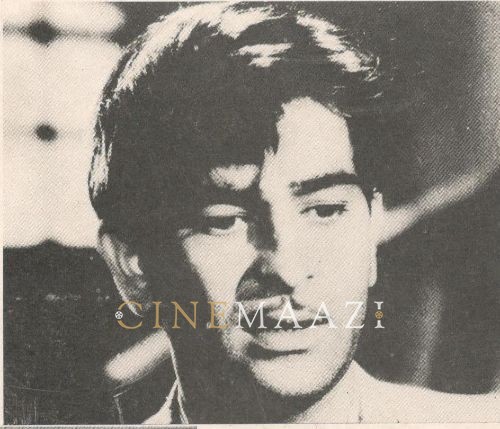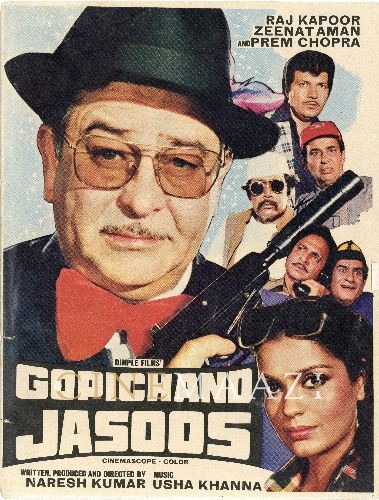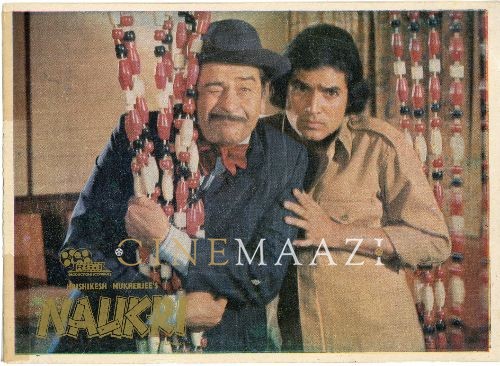Raj Kapoor

Subscribe to read full article
This section is for paid subscribers only. Our subscription is only $37/- for one full year.
You get unlimited access to all paid section and features on the website with this subscription.
Not ready for a full subscription?
You can access this article for $2 , and have it saved to your account for one year.
- Real Name: Srishti Nath Kapoor
- Born: 14/12/1924 (Kapoor Haveli, Peshawar Pakistan)
- Died: 02/06/1988 (New Delhi)
- Primary Cinema: Hindi
- Parents: Prithviraj Kapoor , Ramsarni Kapoor
- Spouse: Krishna Malhotra
- Children: Randhir Kapoor , Rishi Kapoor , Ritu Nanda, Rajiv Kapoor, Rima Jain
Given the epithet of the Showman, Raj Kapoor was possibly one of the most successful actors—director-producers of his time, both nationally and abroad. He was born on 14 December 1924 in Bombay as Srishti Nath Kapoor. His parents were the actor Prithviraj Kapoor and his spouse Ramsarni Kapoor. Raj Kapoor was the eldest of three siblings, and his younger brothers Shammi and Shashi Kapoor also went on to become well-loved actors of Indian cinema. Srishti Nath later took on the name of Ranbir Raj Kapoor before he settled on the pithier Raj Kapoor that he came to be known as. Born into a film family, Raj Kapoor was a storyteller and a performer even as a child, and he appeared as a child actor in Inquilab (1935).
When he did not perform very well in his matriculation, Raj Kapoor decided to pursue his love for films further. He started as a clapper and an assistant to Kidar Sharma at Bombay Talkies, where he worked for three years for the monthly remuneration of Rs. 70. He also worked as an art director and production manager at Prithvi Theatres, his father’s theatre establishment. While there, he worked in plays like Shakuntala and Deewar.
The filmmaker Bhalji Pendharkar recognized the young man’s potential and provided him with the opportunity to act as Narad in his film Valmiki (1946). His acting career really took off with his role in Kidar Sharma’s Neel Kamal (1947), which also starred Begum Para and Madhubala at the beginning of her career as an adult. He subsequently acted in films like Gopinath (1948), Bawre Nain (1950), Dastan (1950) and Sargam (1950). While he initially faced some flak for what certain critics labelled as overemotive acting, he soon proved his impressive range as an actor for all to see.
Raj Kapoor married Prem Nath’s sister Krishna Malhotra in 1946. They had five children, Randhir, Ritu Nanda, Rishi, Rajiv and Rima Jain. Of them, Randhir and Rishi continued their father’s legacy and still remain among the more popular actors to have acted in mainstream Hindi cinema.
In 1948, Raj Kapoor established his own production house, the famed RK Films banner which produced many of the most celebrated Indian films for a long time. Raj Kapoor made his directorial debut with Aag (1948) under this banner. He starred in the film opposite Nargis. The film still remains an early demonstration of his brilliance as a storyteller, and what he would produce in the years to come. Raj Kapoor continued both acting and filmmaking with features like Awara (1951), Barsaat (1949) and Shree 420 (1955). He often collaborated with the acclaimed writer K.A. Abbas for films like Awara, Shree 420, Jagte Raho (1956) and Bobby (1973). Jagte Raho held the rare distinction of being one of the Hindi films directed by the Bengali theatre stalwart and cultural activist Shambhu Mitra, Awara also earned great praise on its release and was nominated for the Palme d’Or at the Cannes Film Festival in 1965. Among its many merits, Awara also includes a long dream sequence still remarkable for its standout, almost expressionist nature. Raj Kapoor’s social film Boot Polish (1954) was also nominated for the Grand Prize at Cannes. The distinguished filmmaker was asked to be a jury member in the 4th Moscow International Film Festival in 1965. For his role in Hrishikesh Mukherjee’s Anari (1959), Raj Kapoor received the Filmfare Award for the Best Actor in 1960.
Raj Kapoor’s standout films in the 1960s include classics like Jis Desh Men Ganga Behti Hai (1960), Sangam (1964), Teesri Kasam (1966) and Sapnon Ka Saudagar (1968). Starring stalwarts like Padmini, Pran, and Lalita Pawar alongside Raj Kapoor, Jis Desh Men Ganga Behti Hai won the Certificate of Merit for Best Feature Film in Hindi in 1960. Kapoor’s performance in the film also earned him the Filmfare Award for the Best Actor in 1962. Sangam was also considered a landmark film for numerous reasons: it was Raj Kapoor’s first complete film shot in colour, ambitiously made in foreign locations. The film was four hours long when it was made, with two intervals in between. It is still considered one of Raj Kapoor’s best performances on screen, and he was supported in his feat by Rajendra Kumar and Vyjayanthimala, his co-stars for the film. Composed by Shankar Jaikishan, the soundtrack of the film remains unforgettable, with iconic songs like Bol radha bol, Yeh mera prem patra, Dost dost an raha and Har dil jo pyaar karega knitting the complicated narrative of the film into a coherent whole. At the 1965 Filmfare Awards, Sangam bagged Raj Kapoor the awards for the Best Director and Best Editor.
In 1970, the cult film Mera Naam Joker (1970) was released under the RK Films banner. Though the film proved to be a sleeper hit, it faced a devastating blow at the box office upon release which wiped out the production house’s finances. Raj Kapoor introduced his son Rishi Kapoor in the film as a child actor playing the younger self of his father. Raj Kapoor next introduced his son Randhir Kapoor in Kal Aaj Aur Kal (1971) alongside his future daughter-in-law Babita, himself and Prithviraj Kapoor. Over the 1970s and 1980s, he mainly focused on filmmaking, producing and directing films like Bobby, Satyam Shivam Sundaram (1978), Prem Rog (1982) and Ram Teri Ganga Maili (1985). He also continued acting sporadically in films such as Mera Desh Mera Dharm (1973), Do Jasoos (1975), Naukri (1978) and Abdullah (1980) among others. While Mera Naam Joker earned him another Filmfare Award for Best Director, he continued to earn accolades for these later films: Filmfare Awards for Best Director and Best Editor in 1983 and 1986 for Prem Rog and Ram Teri Ganga Maili respectively.
For his immense contribution to the arts, the Government of India felicitated Raj Kapoor with the Padma Bhushan in 1971. In 1987, he was also honoured with the Dadasaheb Phalke Award for his extensive work in Indian cinema. During the ceremony, he suffered from an asthma attack and was hospitalised for a month. He passed away on 2 June 1988 following complications after the asthma attack. At the time of his death, he had been planning another film project, Henna (1991), starring Rishi Kapoor and the Pakistani actress Zeba Bakhtiar. The film was completed by Randhir Kapoor after his father’s demise.
References
https://www.juggernaut.in/books/khullam-khulla-rishi-kapoor-uncensored/preview
http://sureshkohli.net/mera-naam-joker-the-complete-story/
Filmfare review
-
Filmography (63)
SortRole
-
Dhadaka 1990
-

Gopichand Jasoos 1982
-
Abdullah 1980
-

Naukri 1978
-

Chandi Sona 1977
-

Khaan Dost 1976
-
Dharam Karam 1975
-

Do Jasoos 1975
-

Kal Aaj Aur Kal 1971
-

Mera Naam Joker 1970
-

Sapnon Ka Saudagar 1968
-









.jpg)



